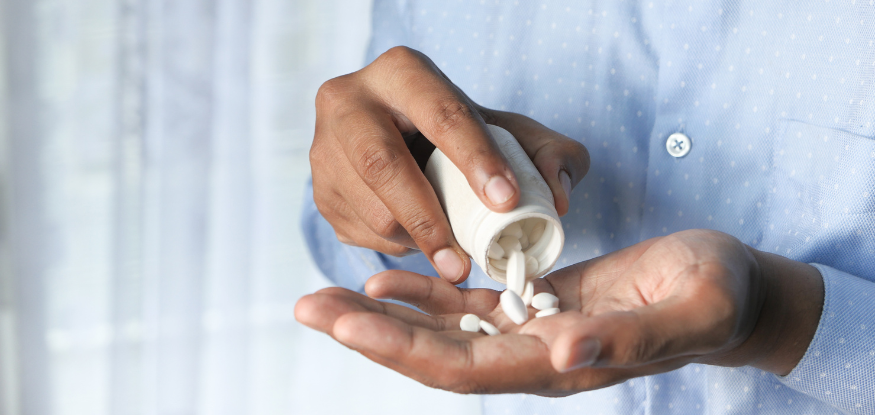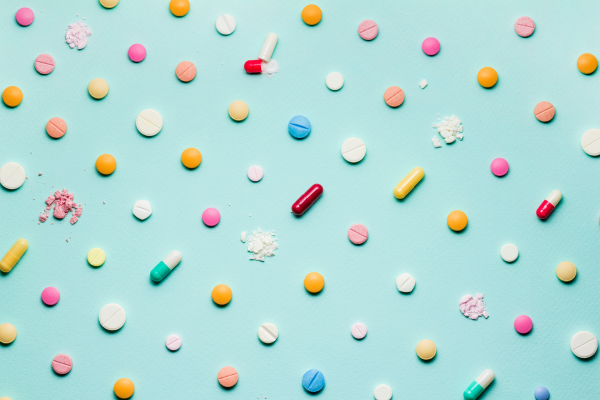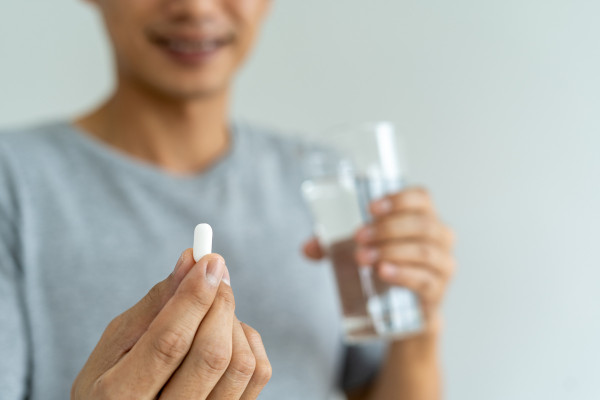How Taking Antidepressants Might Impact Your Sexual Health

If you’ve been paying attention to this space, you know that we love to talk about the importance of sexual health and how to make the most of your sex life. And if you’re new here, then welcome! We’re back to discuss a topic that comes up a lot in my work as a sexual health expert: antidepressants and sex.
Unless you’ve been living under a rock the past few years, you know that things have gotten pretty crazy out here. From sociopolitical unrest to a global pandemic, a lot of us have been going through a lot. Some estimates suggest that the global prevalence of depression and anxiety increased by a whopping 25% in the first year of the pandemic. And even if the worst of the pandemic is behind us, a lot of its effects on mental health have stuck around. According to the National Institutes of Health (NIH), an estimated 57.8 million adults aged 18 or older in the United States had a mental illness in 2021. This number represents nearly 1 in 4 U.S. adults. In the same year, the NIH also estimated 21 million adults in the United States had at least one major depressive episode, representing 8.4% of all U.S. adults. If there’s one thing we’ve learned from the COVID-19 pandemic, it’s that mental health issues are a reality of modern life.
Antidepressant medications are commonly prescribed to alleviate symptoms of depression and other mental health conditions. While these medications offer immense benefits for mental well-being, they can also affect an individual’s sexual health. However, we also know that untreated mental health disorders can have an equally negative impact on one’s sex life. It’s a complicated issue I come across a lot in my practice. What follows is a careful look at the complex relationship between antidepressants and sexual health, exploring their potential impacts, associated challenges, and strategies for managing these effects.

Breaking Down Neurotransmitters and Sex
Antidepressants, such as selective serotonin reuptake inhibitors (SSRIs), serotonin-norepinephrine reuptake inhibitors (SNRIs), norepinephrine–dopamine reuptake inhibitors (NDRIs), and tricyclic antidepressants (TCAs), work by altering levels of neurotransmitters in the brain to regulate mood. The primary neurotransmitters that antidepressants affect include serotonin, norepinephrine, and dopamine. Each of these has unique effects on mood and are simultaneously involved in sexual response.
One helpful way to think about the relationship between neurotransmitters and sex is through an excitation-inhibition model. Some neurotransmitters are excitatory and tend to have a positive effect on sex, while inhibitory neurotransmitters do the opposite. Norepinephrine and dopamine are traditionally thought of as excitatory molecules, while serotonin is considered inhibitory. Various antidepressants cause levels of these molecules to increase in the brain, which is how they ultimately help with depression. SSRIs, for example, result in larger amounts of serotonin in the brain, which is great for elevating your mood. However, because serotonin is a “sex-inhibitor,” SSRIs can also negatively impact sexual function. On the other hand, NDRIs often result in larger amounts of circulating norepinephrine and dopamine, which can have a positive impact on your mood without necessarily diminishing your sexual function.
While sexual side effects have been reported with many antidepressants, some cause greater sexual problems than others. The most problematic antidepressants when it comes to sexual function are:
- citalopram (Celexa)
- duloxetine (Cymbalta)
- escitalopram (Lexapro)
- paroxetine (Paxil and Paxil CR)
- fluoxetine (Prozac)
- sertraline (Zoloft)
All of the antidepressant medications listed above, except for duloxetine, which is an SNRI, are SSRIs. Certain antidepressants like bupropion (Wellbutrin) and mirtazapine (Remeron) have a slightly decreased risk of sexual side effects, but it’s important to remember that sexual problems can occur with almost any antidepressant.

Sexual Desire and Arousal
Two of the most common aspects of sexual health impacted by antidepressant use are sexual desire (libido) and arousal. Selective serotonin reuptake inhibitors are the most commonly prescribed medications for depression. Historically this has been because they have fewer side effects than some older antidepressants like TCAs and monoamine oxidase inhibitors (MAOIs). SSRIs have also become first-line therapy for other mental health conditions, including generalized anxiety disorder. While SSRIs may have a better safety profile, including less effect on weight and blood pressure, they are notorious for dampening aspects of sexual health.
SSRIs can lower libido and disrupt the normal sexual response cycle. These effects may manifest as a decreased interest in sexual activity, including masturbation, difficulty becoming sexually aroused, and/or reduced genital sensitivity. In practice, this has a major impact on a person’s sexual satisfaction and identity. SSRIs can cause people taking them to think about sex less, masturbate and fantasize less frequently, and sexually avoid their partner. This can cause some to withdraw from romantic and sexual relationships altogether. Some people on SSRIs will even describe a complete lack of feeling in their genitals during sex, making the entire sexual experience devoid of pleasure. Just think about how this might, over time, affect your self-esteem or interfere with pursuing or maintaining romantic and sexual relationships.
Erectile Dysfunction (ED)
The inability to achieve and/or maintain an erection can kill the mood in the bedroom and negatively impact your mood overall. But what if the medication you’re taking to improve your mood is making it harder to stay hard and negatively affecting your performance in bed? This is an all-too-common occurrence in people taking antidepressants. Complicating the issue is that depressed men often have higher rates of sexual dysfunction, including erectile dysfunction. So, it would seem that you’re damned if you do, and you’re damned if you don’t.
Thankfully, when it comes to ED, not all antidepressants are created equal. Not surprisingly, SSRIs are notorious for interfering with erections. Certain SSRIs (like paroxetine) can cause up to 75% of takers to experience erectile dysfunction. But erectile problems can also occur with SNRIs, some of which can have similarly high rates of ED. TCAs have more side effects overall, but some seem to have less detrimental effect on erectile function than SSRIs and SNRIs. Bupropion is another antidepressant with a better sexual side effect profile but can cause an increase in anxiety in some.

Ejaculation/Orgasm
Antidepressants can also affect sexual performance by interfering with your ability to ejaculate and orgasm. Delayed ejaculation/orgasm and anorgasmia (the complete inability to orgasm) can occur in people of all genders taking antidepressants. Some who experience these effects begin to wonder what’s the point of having sex at all. I mean if you can’t finish, then why engage in sexual activity? This can, in turn, lead to some of the other sexual problems we’ve already discussed, like decreased arousal, diminished libido, and difficulty getting or maintaining an erection. It becomes a vicious circle, a sexual self-fulfilling prophecy. Moreover, ejaculation and orgasm difficulties can cause distress and strain relationships, further exacerbating the emotional burden associated with mental health conditions.
Psychological Factors
It is important to note that sexual health is influenced by various factors, including psychological well-being. Mental health conditions themselves can contribute to sexual difficulties. Studies show that sexual dysfunction might be related to primary or secondary mental illness, psychotropic medications, psychosocial issues, and the use of substances in people living with mental health conditions. However, the improvement of these conditions through antidepressant treatment may indirectly enhance sexual health by allowing one to achieve a higher degree of functioning in every aspect of their life, including sex. Conversely, the distress caused by sexual side effects from antidepressants can adversely impact mental well-being, making the balance between treating depression and managing potential negative effects on sexual function a tricky endeavor.
Managing Sexual Side Effects
When it comes to sexual side effects from antidepressants, having an open dialogue with your healthcare provider is crucial. If it’s something you’re concerned about, bring it up before you start treatment. Mental health professionals and primary care providers often focus on fixing the depression and sometimes overlook the potential negative impact their treatments may have on your sex life. So, remind them. Let your provider know that preserving your sexual function is a top priority. This will help them choose the best treatment option for you.

If they occur, several strategies can be employed to manage the sexual side effects of antidepressants effectively. Sometimes the solution is as simple as a dose adjustment, whether that be decreasing your dose or switching how you take it. Sometimes sexual side effects can improve over time, so make sure not to quit cold turkey without first discussing it with your provider. If a dose adjustment isn’t doing the trick, then maybe consider switching to a different antidepressant. Again, this should be done under the guidance of your healthcare provider. Thirdly, using combination medical therapy can sometimes alleviate sexual side effects while maintaining the therapeutic benefits of an antidepressant. For instance, adding a medication like bupropion (an NDRI) to an SSRI can sometimes counteract the negative sexual impact of the latter. Additionally, incorporating non-pharmacological approaches such as psychotherapy, couples counseling, and lifestyle modifications can also be helpful.
Shared decision-making between patients and healthcare providers plays a vital role in addressing sexual side effects. It is essential for individuals to openly discuss their concerns and goals related to sexual health, allowing healthcare professionals to tailor treatment plans accordingly. Patient education regarding potential sexual side effects and realistic expectations can help individuals make more well-informed choices.
Conclusion
For a myriad of reasons, depression, and anxiety is on the rise, especially in young people. Many of those affected will benefit from antidepressant therapy. While it is clear that taking antidepressant medication can significantly impact sexual health, it is not inevitable. First and foremost, it is essential for individuals living with mental health conditions to be aware of these potential effects. While antidepressants offer substantial benefits for mental health, they may also cause disruptions in sexual desire, arousal, erectile function, and ejaculation/orgasm. Open communication with healthcare professionals, exploring alternative medications, and incorporating non-pharmacological strategies can contribute to managing these side effects effectively. By prioritizing shared decision-making and seeking comprehensive support, individuals can strike a balance between mental well-being and sexual health should they require and benefit from antidepressant treatment.
